Weather warnings and what they mean
These are issued when MetService alerts us to severe weather. MetService defines weather watches and warnings as:
- Weather Watch (Yellow) – issued when severe weather is possible but not yet certain. Watches are typically announced one to three days in advance to encourage people to be prepared and monitor forecasts.
- Weather Warning (Orange) – issued when severe weather is expected and meets MetService’s criteria. Warnings may be triggered by heavy rain, strong winds or snowfall exceeding specific thresholds.
- Weather Warning (Red Warning) – the highest level of alert, issued for extreme weather that is likely to cause significant disruption or damage.
Visit the Met Service NZ website to learn more Met Service NZ Weather Warnings explained
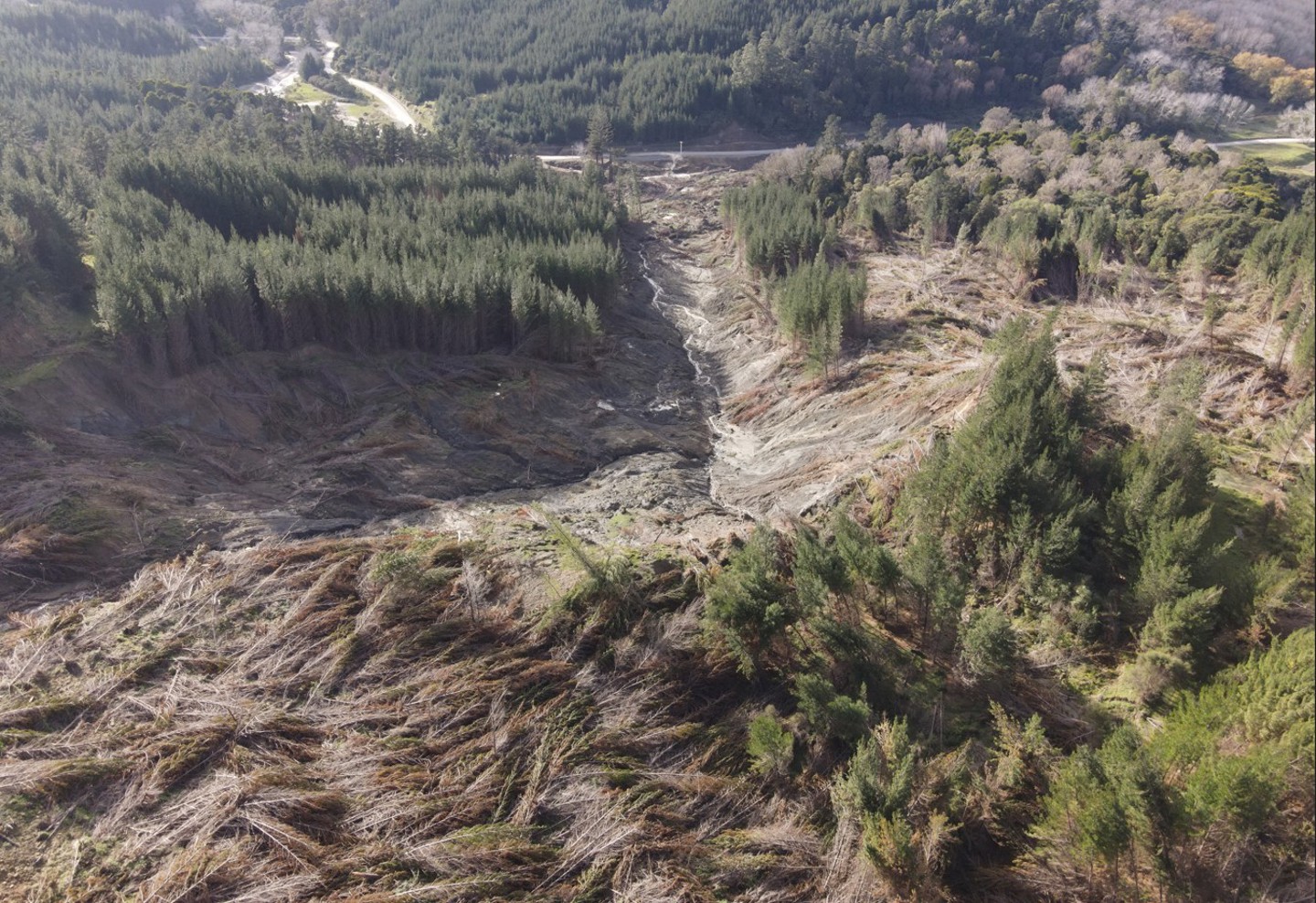
Mangahauini Gorge/SH35 landslide Photo Dr Murry Cave
Alerts and Activations
TEMO have been alerted to a possible situation and is in a monitoring and information gathering mode from organisations including MetService, Earth Sciences New Zealand and the National Emergency Management Agency.
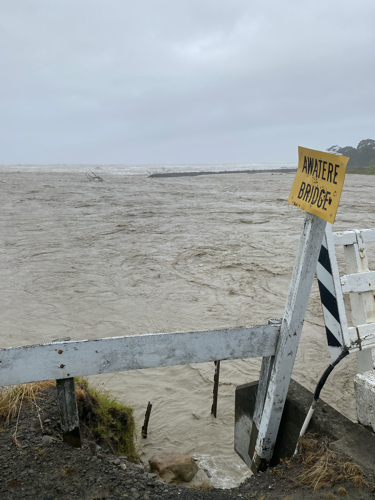
Declared State of Emergency
A state of local emergency is declared under section 68 or section 69 of the Civil Defence Emergency Management Act 2002.
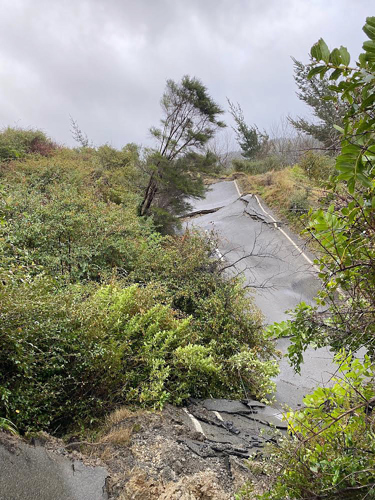
This is a situation that:
- is the result of any happening, whether natural or otherwise, including an explosion, earthquake, eruption, tsunami, land movement, flood, storm, tornado, cyclone, serious fire, leakage or spillage of any dangerous gas or substance, technological failure, infestation, plague, epidemic, failure of or disruption to an emergency service or a lifeline utility, or actual or imminent attack or warlike act; and
- causes or may cause loss of life or injury or illness or distress or in any way endangers the safety of the public or property in New Zealand or any part of New Zealand; and
- cannot be dealt with by emergency services or otherwise requires a significant and coordinated response under the Act.
State of National Emergency
Declared under Section 66 of the Civil Defence Emergency Management Act 2002.
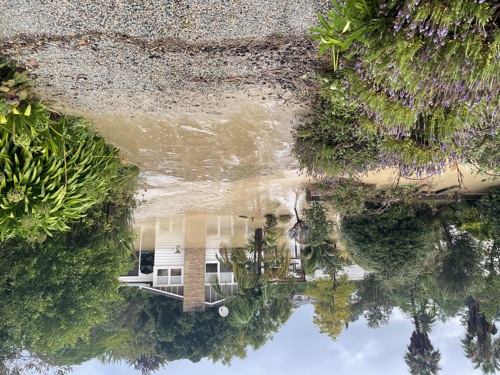
A flooded property in Fitzherbert Street during Cyclone Gabrielle 2023. Photo by Dr Murry Cave
How prepared are you and your whanau?
Always be prepared. Emergencies can happen anytime.
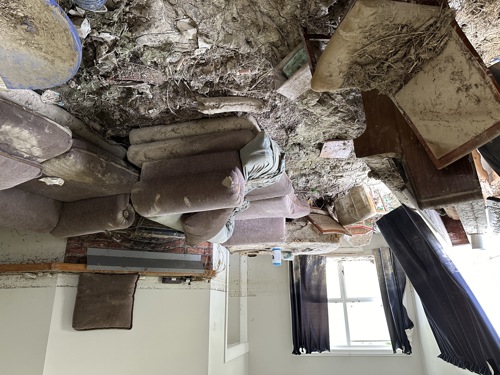
Be ready for any disaster
Emergencies can happen anytime – are you and your whānau prepared?
You should be able to cope on your own for at least five days. Here's a basic guide to what you'll need:
- An emergency plan – where to meet whānau and how to contact one another if separated.
- Prepare a grab bag of essential items.
- Enough food in your home to last up to 5 days.
- Know where to get water or have emergency drinking water as part of your household supplies.
- Alternative lighting – a torch with spare batteries or a wind up one, gas lantern or light-sticks.
- Battery operated or wind-up radio and spare batteries – don't forget your car radio as a last resort.
- First aid kit – make sure it includes any essential medications.
- Blankets, survival blankets or warm waterproof clothing.
- Alternative cooking methods like a BBQ or gas cooker.
- Store important family documents where you can get them easily, scan your key documents onto a USB memory stick.
What’s in a Grab Bag?
Have a grab bag for each of your whānau and have them ready to go
Each bag should have:
-
- warm clothes
- a bottle of water
- snacks
- copies of important documents and photo ID.
Key things to bring:
-
- medications you may need
- a first aid kit
- a torch
- a radio and batteries.
At Home
If you are trapped in your home due to an emergency there are a few things you should have in place. Make sure they're easy to find in a hurry or in the dark.
- Water for five days or more — as a guide you need at least nine litres of water for every person, for drinking, washing and cooking
- Long-lasting food that doesn’t need cooking (unless you have a gas cooker or BBQ)
- Food and drink for babies and pets
- Toilet paper, large plastic buckets for an emergency toilet, soap, toothbrush and sanitary items
- A first aid kit and essential medicines
- Torch and additional batteries
- Map of the area marked with places to meet and contact details.
- Dust masks and work gloves.
What’s your whānau plan?
Emergencies can happen anytime, anywhere and often without warning.
It’s important you and your whānau have a household emergency plan and practice it.
Where would you meet if there was no way of contacting each other?
If you care for young or elderly people or those with a disability or mobility problem or whānau who are ill or injured, what might be some special needs to consider?
Have you thought about your animals?
Some welfare centres allow for pets – if you have a cage for them, bring that too. Pack food and water for your pets as well. Have you planned and provided for other livestock?
What is your children’s school or day care evacuation plan?
Ask to see your school’s evacuation plan and know where they will take the children to.
Be across the emergency plan at work and other places your family spend time
Know what to do in case whānau are separated in an emergency. Be familiar with the evacuation routes and plan several routes just in case.
Tairawhiti Tsunami and Earthquake Booklet
Marcus showing what is in his grab bag
Emergencies generally don’t keep any set hours so you need to make sure you have plans that cover your life – work, home and school.
· Identify the risks to your business and staff
Find out what the risks are and how they can impact your business. This could include natural hazards, health emergencies and utility failures.
Here’s a link to help identify risks at work from business.govt.nz MBIE website
Make an emergency plan for your business
Businesses have an obligation to be prepared for any emergency. While we can’t predict when an emergency will happen, we can make plans to ensure our staff are safe, our financial and personal losses are reduced and we are able to get back to business as soon as possible.
Your plan should include –
· Emergency procedures for fire, earthquake, tsunami and other hazards
· Assembly points, wardens and first aid training
· An evacuation plan should your business be in an inundation zone
· How to contact staff, suppliers, clients and insurance providers
· Alternative arrangements should you be unable to access your premises.
Talk to your disabled staff and find out what support they may need if there is an emergency.
Here’s a link on emergency planning from business.govt.nz
Have a Civil Defence cabinet
These suggestions for equipment and food are guidelines only. What you need will depend on the number of staff, the nature of your business, the type of building, and your location.
- Blanket, foil
- Blanket, wool
- Stretcher, foam
- Stretcher, board
- Rope, poly 30m
- Rope, sisal 12m
- Torch, batteries
- D batteries
- Radio, batteries
- AA batteries
- Gloves/debris
- Dust mask (rated P2 or N95)
- Goggles
- Water
- Water tablets
- Hard hat
- Bucket
- Plastic bin bags
- Wrecking bar
- Saw, wood
- Saw, hack
- Sledge hammer
- Cutter/pliers
- Axe
- CD first aid kit
- Meths stove for water
- 3 litre billy for water
- Matches (box)
- Lighter
- Disposable gloves
- Toilet paper
- Sanitary needs
- Broom
- Brush/pan
- Disinfectant
- Mouth guards
- Light sticks
Prepare a plan for your farm or lifestyle block
Rural communities, businesses and individuals need to adapt and build resilience to emergencies. Your animals are your responsibility, so include them in your emergency planning. Failing to plan for them could put lives at risk.
Here’s a link with some advice from mpi.govt.nz
Get your school ready
Every school needs to have an evacuation plan in place and parents or grandparents shouldn’t hesitate to ask to see it. Schools play a large role in keeping the community safe.
Your school or early childhood centre may face an emergency. It’s important to be prepared for emergency events and know how to respond if they happen.
Early learning services and schools should have an emergency management plan for all hazards they may face.
Here’s a link to the Ministry of Education with some advice and guidelines to help you prepare your school for emergencies.
Teach emergency preparedness
This is one of the most important things you can teach your students. We know they take home your lessons to their whānau who will understand more about preparation for an emergency – like having a whānau plan, an evacuation route and more.
What’s the Plan, Stan? is a free resource to support schools, teachers and students develop the knowledge and skills to prepare for emergency events. It’s got some fantastic info in very easy to understand language.
Here’s the link https://getready.govt.nz/prepared/school/whats-the-plan-stan
Get your marae ready
This Marae Emergency Preparedness Plan is designed to help marae be as prepared as possibly in the event of a natural disaster or emergency. Preparedness planning enhances resilience and safety of marae, taonga and iwi. The plan encourages whānau, hapū and iwi to –
· Think about the possible impacts of natural disasters
· Recognise who could be called upon in the event of an emergency
Work through the plan to figure out what your marae will do. Here’s the link from Te Puni Kokiri https://www.tpk.govt.nz/en/o-matou-mohiotanga/marae-development/civil-defence-marae-emergency-preparedness-plan-20
Where to Get Help
Tairāwhiti is a region that by its very makeup and location, can be prone to natural disasters. From earthquakes to tsunami, weather bombs, floods and more.
When disaster strikes you need to know what to do. Do you and your whānau have a plan? Are you familiar with your children's school's evacuation plan? Where will you get your information from?
TAIRĀWHITI EMERGENCY MANAGEMENT (TEMO)
![]() Follow us Tairawhiti Civil Defence Facebook page
Follow us Tairawhiti Civil Defence Facebook page
RADIO
- RadioNZ
- AM 1314
- FM 101.3/97.3
- More FM
- 98.9/90.1 Gisborne
- 98.9 Wairoa
- Tūranga FM
- 91.7
- Radio Ngāti Porou
- 89.3 Tikitiki
- 90.5 Tolaga Bay/Tītīrangi
- 93.3 Gisborne/Wheatstone Road
- 98.5 Gisborne
- 105.3 Te Araroa
- 106.5 Tokomaru Bay
- Uawa FM
- 99.3
OTHER FACEBOOK PAGES 
- Gisborne District Council
- MetService Facebook
- NZ Civil Defence
- Eastern District Police
- FirstLight Network
- Tairawhiti Fire and Emergency NZ
WEBSITES
IMPORTANT PHONE NUMBERS
- In an emergency - 111 (Police, Fire and Ambulance)
- Gisborne District Council - 0800 653 800
